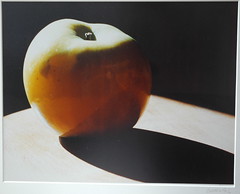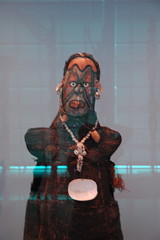being sort of a (not really) review of Barbara Sprout's Primal MythsOne of the first myths in my life that I took seriously, that I believed in and made my own was Lao Tzu's
Tao Te Ching. The edition I have is an over-sized book, with black and white nature photography, Chinese characters on one side and the translations, by Gia-Fu Feng and Jane English on the other. The form and layout of the book, its mysteriousness on one hand (side), and the sparse, clean language on the other hand (side), are tied up deeply with the content — Tzu's thoughts on mystery and clarity, the habits of water and the methods of kings. This, for me, has become a primal myth, and a centering force in my life. Even now, I have a hard time judging the quality of different translations. They all seem inferior to the one I have read and reread throughout my life, beginning in middle school and high school.
Myths can be provocative. I believe they need to reach us early, or at least during a period of intense questioning, if they are to become important, and not merely "useful" for a writer. When I first read this book, the first lines "The Tao that can be told is not the eternal Tao, / The name that can be named is not the eternal name." I felt that here was something I needed to keep deep inside me if I was going to understand it. It was not going to be something I could talk much about, or speak with others about. Speaking would, as Tzu says, limit my understanding. For these words to transform me, I had to consume them. I had to read them as if they were the key to understanding the universe (they are), and then I had to bury that key as deep inside me as possible, so that it would affect my entire being (it has). Otherwise, I felt, the words would be only words, written by a fallible human being, and I would have to evaluate them, and look for the humanness, and they would lose all effect. If I began to talk about, or try to explain the book, even to myself, I would not understand the Tao, but only my own explanation, which would never be enough.
Soon enough I began to come across other translations of the book. I started to understand that, as this was a translation, and since even the original was a translation of an experience — Tzu's own translations of his experience and understandings — that my best option would be to read closely, then to leave the book behind, and search for my own experiences of the Way — the Tao. This is, I think, the real, best, most vital effects of myth. Myth points a way to understand the world. But it is only a set of instructions — a guide for a practice. You cannot understand the myth unless you practice it. You cannot be moved by it unless you make it personal. And the practice is the way you adopt and solidify the myth.
Barbara Sprout, in her introduction to the book
Primal Myths, makes a case that even the myths we don't literally believe in anymore affect our values — as evidence, she takes the Judeo-Christian creation myth (adam and eve) and shows how the values set forth it in (God giving Adam body and life) affect our western understanding of the body as sacred, divine gift made in God's image. I'm not sure if I would call myself a Taoist, but in this way the Tao has (and continues to) influence(d) my life. My sense of self is of one who is most successful overcoming obstacles through yielding. When I am unsure what to do, I take stock of my surroundings, and then make efforts to "align" myself with my "world" — to allow the universe to direct me, to "attend fully" and "be supple" to be able to do nothing, to receive the heavy winds like a palm tree and still stand. All this comes from a deep-seated sense of the workings of the universe as outlined by Lao Tzu.
And, of course, it follows that this affects my writing in great and terrible ways. On the most basic level, of course, the
Tao Te Ching is a book of poems. A book of poems that I read deeply and seriously as a young kid. To say this influenced me to become a poet is to say very little. I don't all my own reasons for doing things but it could well be that I am only still writing poetry so fervently, because of this book. Also, I have a tendency to reach for the great and sweeping wise pronouncement when writing. It's easy to see where this comes from. I search — constantly — to write something as filling, as powerful, as world-organizing, as this book.
Of course that doesn't mean that I am now unavailable to other people's myths. Christian myth figures heavily into my value system (as it does to almost all of us). I remain fascinated by Greek, Roman, and Nordic myths that are always peeking in around the edges of culture. And I'm fascinated by myths that are near utterly unfamiliar to me — African and Vedic myths, for instance. In Sprout's book, which is as complete a collection of creation myths as I've seen, the Dogon myth, with its themes of ruined purity, numerology and spatial arrangement, food distribution and architectural symbolism is fascinating. I'd like to write a poem or several that incorporates some of those ideas. But the ideas feel interesting only at arm's length — like a curious story I would like to read more of. But the stories Sprout collects don't feel, in any sense,
real. If I make the decision to use African, or Native American or Vedic mythology when writing, is a choice I can make. But I feel like it will always feel a little bit shoved-in. A little cold. I cannot make the decision to draw on the
Tao Te Ching however. It is deeply a part of me. To some degree, it is present in everything I write.



